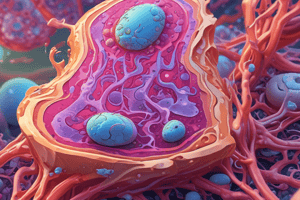Podcast
Questions and Answers
What is the definition of pathology?
What is the definition of pathology?
Study of the nature and causes of diseases, including their effects on the structure and function of the body.
Who is credited with the humoral theory of disease?
Who is credited with the humoral theory of disease?
Hippocrates
What is the role of pathologists in disease management?
What is the role of pathologists in disease management?
Identifying abnormalities at the cellular and molecular levels to guide treatment planning.
What is the scope of pathology?
What is the scope of pathology?
Who is known for cellular pathology?
Who is known for cellular pathology?
What is the role of pathologists in disease diagnosis?
What is the role of pathologists in disease diagnosis?
How do pathologists contribute to patient care?
How do pathologists contribute to patient care?
What are the research areas in pathology?
What are the research areas in pathology?
What are the subspecialties within pathology?
What are the subspecialties within pathology?
What are some emerging trends in pathology?
What are some emerging trends in pathology?
What are the three main laboratory analysis procedures mentioned in the text?
What are the three main laboratory analysis procedures mentioned in the text?
What is the purpose of quality control in laboratory testing?
What is the purpose of quality control in laboratory testing?
What are the components of quality assurance in laboratory testing?
What are the components of quality assurance in laboratory testing?
What are some regulatory requirements for laboratory testing?
What are some regulatory requirements for laboratory testing?
What are some continuous quality improvement (CQI) initiatives mentioned in the text?
What are some continuous quality improvement (CQI) initiatives mentioned in the text?
What are the two main techniques for tissue examination discussed in the slides?
What are the two main techniques for tissue examination discussed in the slides?
What is the purpose of Hematoxylin and Eosin (H&E) staining?
What is the purpose of Hematoxylin and Eosin (H&E) staining?
Why is understanding basic tissue types and their functions important in histological analysis?
Why is understanding basic tissue types and their functions important in histological analysis?
What are the three main roles of biochemistry in pathology discussed in the slides?
What are the three main roles of biochemistry in pathology discussed in the slides?
Give an example of a clinical chemistry test used to assess liver function.
Give an example of a clinical chemistry test used to assess liver function.
What are the major groups of microorganisms discussed in medical microbiology?
What are the major groups of microorganisms discussed in medical microbiology?
Name three bacterial pathogens commonly associated with infectious diseases.
Name three bacterial pathogens commonly associated with infectious diseases.
Explain the importance of microbiological culture techniques in medical microbiology.
Explain the importance of microbiological culture techniques in medical microbiology.
What are some examples of virulence factors used by pathogens to establish infections?
What are some examples of virulence factors used by pathogens to establish infections?
Describe the significance of antimicrobial susceptibility testing in medical microbiology.
Describe the significance of antimicrobial susceptibility testing in medical microbiology.
What is the role of hematology in healthcare?
What is the role of hematology in healthcare?
Describe the functions of white blood cells.
Describe the functions of white blood cells.
What are the components of blood and their functions?
What are the components of blood and their functions?
Which hematological test is used to evaluate iron deficiency anemia?
Which hematological test is used to evaluate iron deficiency anemia?
What diagnostic tests are commonly used for leukemia?
What diagnostic tests are commonly used for leukemia?
What term refers to the onset of permanent damage and death in the progression of a disease?
What term refers to the onset of permanent damage and death in the progression of a disease?
When the disease settles down but leaves behind sequelae, what trend in disease progression is being described?
When the disease settles down but leaves behind sequelae, what trend in disease progression is being described?
What is the period of time without any obvious signs or symptoms from exposure referred to as?
What is the period of time without any obvious signs or symptoms from exposure referred to as?
Which stage of disease progression describes the variety in severity or range of manifestations of a disease?
Which stage of disease progression describes the variety in severity or range of manifestations of a disease?
Following clinical onset, which trend in disease progression may result in death?
Following clinical onset, which trend in disease progression may result in death?
Which stage of disease progression describes the variable period of time without any obvious signs or symptoms from the time of exposure?
Which stage of disease progression describes the variable period of time without any obvious signs or symptoms from the time of exposure?
Which of the following trends in disease progression may result in death, following clinical onset?
Which of the following trends in disease progression may result in death, following clinical onset?
What term refers to the onset of permanent damage and death in the progression of a disease?
What term refers to the onset of permanent damage and death in the progression of a disease?
When the disease settles down but leaves behind sequelae, what trend in disease progression is being described?
When the disease settles down but leaves behind sequelae, what trend in disease progression is being described?
Which stage of disease progression describes the expression of the disease, where the signs and symptoms become apparent?
Which stage of disease progression describes the expression of the disease, where the signs and symptoms become apparent?




